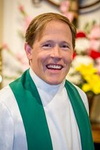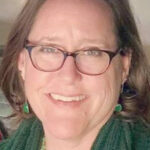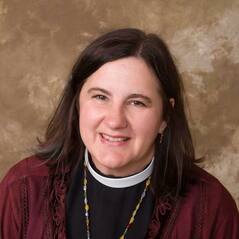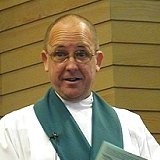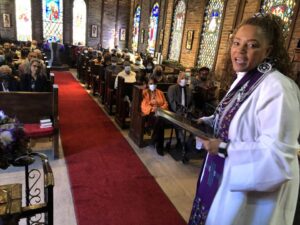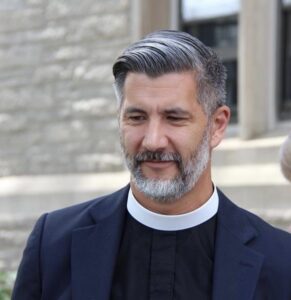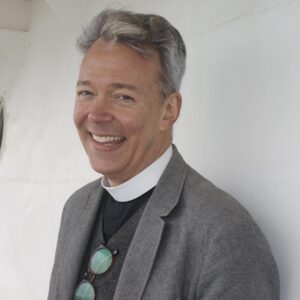Americans may seem more divided politically than ever, but some Southern Californian Episcopal priests with “purple” congregations say that discord doesn’t typically factor into their Sunday-morning sermon time.
“Generally, I don’t speak directly about politics. Unless that is, one considers talking about justice, or equality, or mercy, or the dignity of every human being ‘political,’” the Rev. Patrick Crerar, rector of San Clemente’s St. Clement by-the-Sea Episcopal Church, told The Episcopal News via email. “To me, these are Gospel and baptismal imperatives no matter who occupies the Oval Office. And I preach about these themes all the time.” Yet, there are times that demand a more direct message, added Crerar, whose congregation is purple, consisting of members who identify as voting with both major “red” and “blue” political parties. “When actions of the President and the unelected head of an unofficial government agency act egregiously, it needs to be addressed,” Crerar said. “Firing tens of thousands of government workers without cause was bad enough. But then to have (Elon) Musk malign some of those workers by calling them ‘evil,’ was unacceptable. Having come here from just outside Washington D.C., I knew many dedicated federal workers from a panoply of agencies (including USAID) and probably every branch of the military. “The fact is that people suffer under tyrants,” he said. “That was true in ancient times. It was true in the times of Jesus. And it is true to our very day. Words matter, and to bear false witness against another is a sin. And no preacher should hesitate to speak out against sin.”
Many diocesan Episcopal churches are purpole, like St. Cross, Hermosa Beach, where the Rev. Rachel Nyback says: “Some in my parish wear a MAGA hat and some wear a Black Lives Matter hat and they all go to communion together every week. But sometimes that’s not easy.”
A 2023-2024 Pew Research study revealed that 37% of Episcopalians in the U.S. identify as Republican; while 57% identify as Democrat and another 6% reported having no particular political leaning. A 2024 report by Facing History and Ourselves, a global nonprofit educational resource, indicated that nationally in 2022, 62% of Republicans and 54% of Democrats viewed one another unfavorably.
The Rev. Canon Kelli Grace Kurtz, who is rector of All Saints Church in Riverside, a congregation Kurtz describes as “purple, but leaning a bit blue,” said navigating differences among political ideologies is a reality. Since the election, “one couple has backed away from the church. They were very strongly in the MAGA camp. “A mantra I tell myself – and people who ask how it’s going – is, to me it doesn’t matter how you voted, whether you want a conservative approach to government or a progressive or liberal or libertarian,” Kurtz said. “The inauguration has happened, and this is where we are now. I preach the baptismal covenant – it’s so very clear, and if that pushes on them, there’s not a whole lot I can do about that. I’m not going to argue political leanings; I’m going to preach from what I hear the Gospel saying, which is, whatever you do, do it with compassion, with love for neighbor, a sense of justice and of mercy.” Kurtz praised Washington Bishop Mariann Edgar Budde whose plea to President Trump “to have mercy on those who are scared now” during her sermon preached Jan. 21, 2025, the day following the inauguration, drew widespread controversy, with many conservatives condemning her remarks and others commending them. Kurtz said: “I’m so very thankful for Bishop Budde—she’s given all of us preachers courage and a fine example of how to preach across differences. I don’t know how you can argue with the preacher saying to the newly inaugurated, please remember to be merciful.” Similarly, “I can’t argue with somebody who’s upset I preach on the baptismal vows, because it’s not arguable. I like to think I’m giving the congregation spiritual tools for their journey.”
The Rev. Canon Rand Reasoner said Prince of Peace Episcopal Church in Woodland Hills, where he serves as rector, is among the L.A. diocese’s most politically, ethnically, theologically diverse congregations, counting Ugandans, Nigerians, Jamaicans, Persians, Asians, Hispanics and Anglos among its membership. The church leans blue – with about 70% “traditional Episcopal progressive” and about 30% conservative. “It’s pretty wonderful. It feels like the Kingdom of God and we’re all working on how we all work together and how we integrate as a community of God, break out of our cultural barriers, and all sit at the same table. It can be a challenge, but it’s also wonderful work. There’s a lot of good tension here.” Neither that diversity nor the election have impacted his preaching, he added, “although people may hear it differently now, depending on their political bent. But, the Gospel’s the Gospel. It doesn’t change with the circumstances we find ourselves in.” Loving neighbors and taking the good news to others are major themes. An ongoing sermon series on Jesus’s Sermon on the Mount has been well-received, said Reasoner. “We’re dealing with kindness, anger, forgiveness, the Lord’s Prayer, praying for our enemies – all these sorts of things are pretty central in all times in history and maybe need a little more emphasis these days, considering … all the anger out there which doesn’t seem to be leading anywhere.” When talking about what’s happening in the culture with people, he said. “I always ask, ‘how does this fall in line with the Gospel? What does the baptismal covenant have to say about this?” Or, “What is the next right action?” Never underestimate the power of prayer, or of lament, he said, “that God is somehow in the midst of all this and in charge, and I need to see what I need to do next, that I can bring a spiritual power to the forefront in all this.”
Similarly, the Rev. Vanessa Mackenzie, rector of the Church of the Advent in L.A.’s West Adams district, said, “Who we voted for is not the issue. The issue is, why are we here? Why did we come to church today? Whom have we come to worship?” The Trump Administration’s erasure of People of Color and the Trans community from government websites, book banning, and other rollbacks “feel a lot like déjà vu,” after experiencing apartheid in her South African homeland, Mackenzie said. “I worked for apartheid crumbling, and I saw it happen, and it was such an amazing feeling to know that some of us had worked to see this empire crumbling. I didn’t think in my short lifespan, I would experience this again.” The same need to speak truth to power, to stand up, to unapologetically name what is happening, not to compromise our faith and the Gospel, exists now as then, she said. And to use that same resilience and tenacity “of our ancestors, who picked cotton, the same resilience of our ancestors in the belly of the boat… of women who couldn’t get jobs and Black people who went to jail for small things,” she said. “We just need to continue telling ‘the old, old story of Jesus and his love.’”
Like many others, the Rev. Greg Kimura, rector of St. James’ Church in South Pasadena, said he’s been “tiptoeing” around politics, while preaching about “God’s all-embracing love. People need to hear that right now. They’re coming to church because they’re terrified about what’s going on in the country and want to feel there’s one place that is a sanctuary.” Simultaneously, his preaching aims “to make you go out and transform the world,” he said. “The whole world is dealing with this right now, so we can’t pity ourselves too much. We have to figure out how, in small incremental ways, the people we meet in the course of the week to make the world a better more Christlike place.” When receiving pushback, Kimura, the former director of the Japanese American Museum in Los Angeles, says, “I remind folks, I came from a civil rights museum. You all knew who you were calling here. So, buck up. And if you don’t like it, tell me. That’s what it means to be a critical mature believer.” He added; “We’re not here to change people’s minds on political issues. We’re here to bring people into community and fellowship and to use the strong language of the Gospel to get people to think about what’s the way to be a moral Christian in whatever context, whoever’s president.”
The Rev. Shane Scott Hamblen said he preaches before the lessons are read on Sunday mornings and has shifted language to “what’s going on in the world” as opposed to naming a particular political party. “You know like, the world is all about denigrating and tearing people down, but Christ is all about lifting up and building up.” Preaching in advance of the lessons focuses attention more on them, he finds. “It means I’m always preaching in the future tense: ‘you’re going to hear, Jesus is going to say … rather than in the past tense, i.e. Jesus did this 2,000 years ago. I like the liveliness of it, ahead of time. It culminates in the Gospel. Jesus gets the last word, and then we go straight into the creed.” In other words, he added, jokingly, “I don’t have to say Jesus is woke, he’s about to say it. So, pay attention.”

